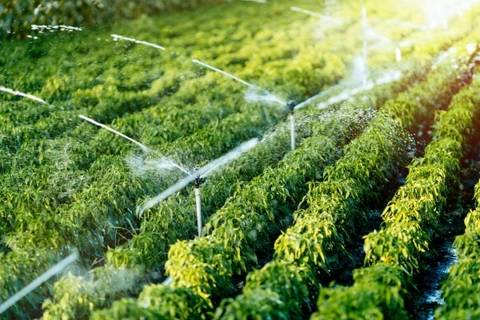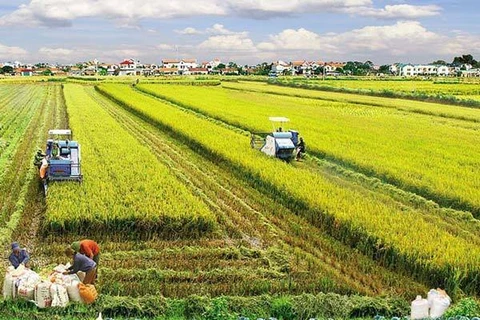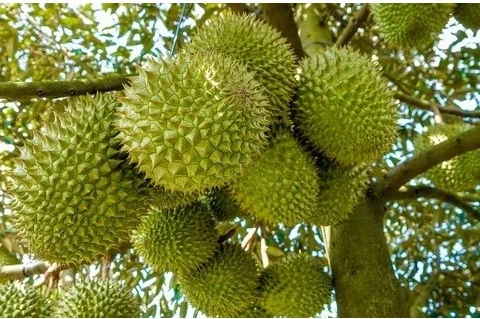 The Ministry of Agriculture and Rural Development is building a project on sustainable development of one million hectares of high-quality, low-carbon rice farming (Photo: VietnamPlus)
The Ministry of Agriculture and Rural Development is building a project on sustainable development of one million hectares of high-quality, low-carbon rice farming (Photo: VietnamPlus) Hanoi (VNA) - Green and sustainable agriculture is becoming the norm in most of Vietnam’s key export industries such as coffee, vegetables, pepper, seafood and livestock. Therefore, changes in production methods are inevitable.
Vietnam is a country with agricultural land making up nearly 75% of the total natural area and the agricultural labour force accounting for 30%. People living in rural areas account for 70% of the population. The agricultural sector has been always considered a "pillar" of the economy, ensuring food and social security.
However, in recent years the agricultural sector has faced major challenges from internal to external factors. These include climate change, market fluctuations and changes in the world consumption trends. These changes require a switch and transition towards a “green-ecological-sustainable” agriculture.
Coffee is one of main agricultural products of Vietnam, especially in the Central Highlands region. But since 2010, the volume of heavy-use coffee land area has increased in the Central Highland provinces, causing productivity to decline by up to 50%. This has a negative impact on the output and quality of coffee for domestic consumption and export.
Besides, inefficient water use, and overuse of chemical fertilisers have negatively affected the environment and coffee beans.
Binu Jacob, General Director of Nestlé Vietnam Company Limited, Co-chair of the Partnership for Sustainable Agriculture Vietnam (PSAV), said that while the coffee industry group promotes sustainable agricultural and low emissions, the pepper and spice industry has also achieved positive results in many localities by reducing irrigation water by up to 25%, cutting the number of pesticides by 15% and increasing the use of microbial organic fertilisers.
The vegetable industry has also saved water using mist and drip irrigation methods. For the agricultural chemical group, many businesses have also applied unmanned aerial vehicles on fields to spray pesticides (UAV/Drone). It has also developed content, documents to provide intuitive and easy-to-understand instructions on the use of pesticides.
The export markets have constantly expanded, Vietnamese agricultural products have been present in 190 countries and territories. Agricultural, forestry and fisheries export turnover increased sharply from 27.76 billion USD in 2013 to a record level of 53.53 billion USD in 2022, repsenting an average growth rate of 7.12% per year.
 Circular agricultural economic models in some localities not only improve economic value but also solve environmental pollution. (Photo: VietnamPlus)
Circular agricultural economic models in some localities not only improve economic value but also solve environmental pollution. (Photo: VietnamPlus) It is important for Vietnam to further develop green, sustainable, environmentally friendly agriculture through a circular economy model in agricultural production. In addition, the pressure to produce agricultural products that meet quality criteria is increasing, especially when the largest agricultural export market, China, imposes stricter standards.
Minister of Agriculture and Rural Development Le Minh Hoan emphasised that in the context of a changing climate, market and consumer choices are also diversifying. Therefore, agricultural production must certainly change to create new values. The new context requires agricultural products to be responsible to consumers, ensure the benefits of small-scale farmers, and be sustainable for the global environment.
The minister said that Vietnam’s agriculture needs to demonstrate stronger responsibility to the international community, especially in preserving resources and biodiversity, reducing emissions, and adapting and co-adapting to climate change, he said.
Hoan affirmed that the industry will develop towards green agriculture and ecological agriculture by synchronously applying processes and technology. The industry should effectively optimise natural resources without affecting the environment or human health.
Vietnam has committed to achieving net zero carbon emissions by 2050, reducing methane emissions from rice by 30% and halting deforestation by 2030. The shift to a sustainable, green agriculture sector will make a great contribution to building a green economy and fulfilling Vietnam's commitments./.























